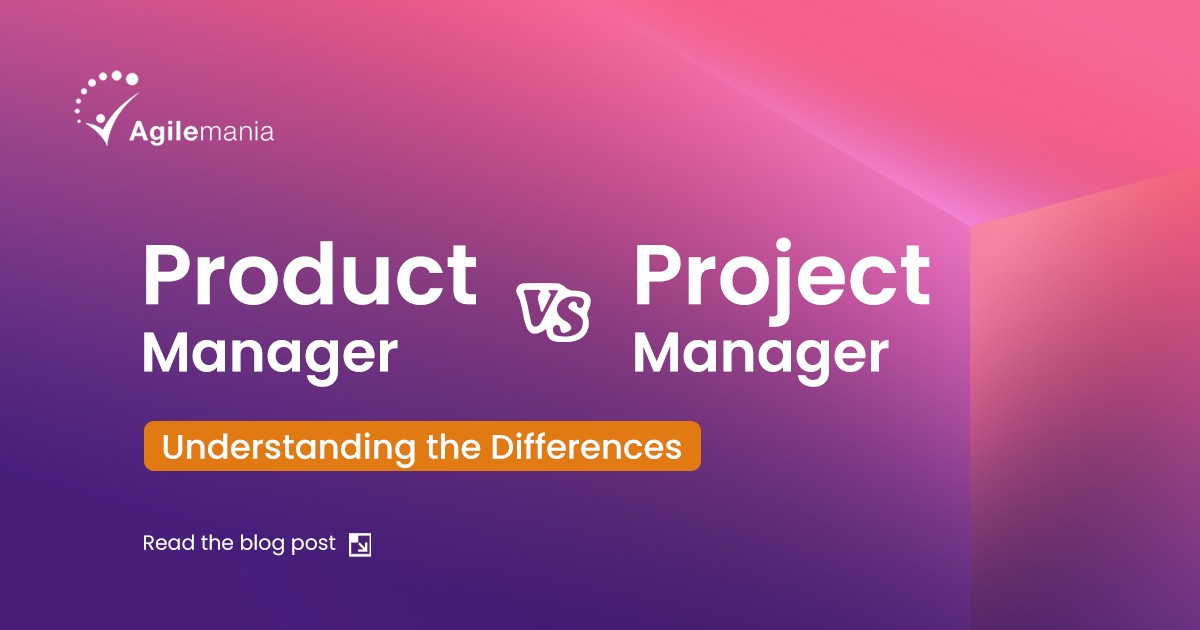
Satyajit Gantayat
Satyajit has broad and deep experience in Agile coaching at the strategic senior executive level wh... Read more
No courses found...
No courses found...

Satyajit Gantayat
Satyajit has broad and deep experience in Agile coaching at the strategic senior executive level wh... Read more

Product managers and project managers are two similar-sounding but actually quite different roles. Both are critical to the success of a tech company, but they serve different functions. In this post, we’ll discuss the key differences between the two roles.
A product manager is responsible for the strategy and roadmap for a specific product or product line. Their main responsibilities include:
Defining the product vision and strategy
Determining what features and functionality the product needs based on market analysis and customer research
Prioritizing features and capabilities in the roadmap
Working closely with engineering teams to guide product development
Coordinating with other functions like marketing, sales, and support to make sure everyone understands the product direction
In essence, a product manager is focused on understanding the market landscape and user needs and charting the strategic direction for the product. They decide what gets built and in what order.
Whereas project managers focus on execution and delivery. The project manager takes the product roadmap and breaks it down into specific projects and milestones to get those strategic initiatives built.
Key responsibilities include:
Creating detailed project plans and setting milestones
Estimating resources and budgets required to complete projects
Coordinating activities across functions and ensuring collaboration
Monitoring progress and reporting on metrics to leadership
Identifying and managing project risks and issues
The product manager decides what gets built strategically, while the project manager focuses on getting each of those things built on time and within budget. The two roles work hand in hand to balance strategy with execution.
While both roles require strong leadership and communication skills, product managers need to be more data-driven strategic thinkers, while project managers need superior organizational skills to manage complex projects.
Understanding these key differences is important for supporting the success of both of these critical functions.
A product is an ongoing good or service a company makes available to customers. An example of a product is Netflix. People can continuously sign up for and use the Netflix streaming service.
It provides ongoing value. Companies work to maintain and improve their products over long periods of time so that customers keep using them.
A project is a temporary effort to produce a result or complete an objective. Projects have defined start and end times, unlike products, which are continuous.
For example, building a new feature for the Netflix app would be considered a project. The project would have a goal (implement the new feature), milestones, and deadlines for getting the work done.
Once the new feature launches, that particular project ends, though the Netflix product continues.
In essence:
Products are ongoing, long-term goods or services for customers
Projects are short-term initiatives focused on a specific goal or result
The work of product managers revolves around the continuing strategy and evolution of products over time. Project managers work on temporary projects to achieve milestones that contribute towards enhancing and supporting products.
A product manager is focused on the long-term strategy for a product. They work to identify new features and improvements that customers want. The product manager decides what gets built and in what order.
A project manager takes those desired features and manages the short-term work needed to bring them to life. The project manager oversees the projects to develop certain features or product updates by specific deadlines.
For example, the product manager at Netflix might decide customers would benefit from an improved recommendation algorithm. They make it a priority on the Netflix product roadmap.
The project manager would then get to work planning out a project to build this new algorithm update.
They would organize the engineers and designers who must contribute and set milestones to deliver this improved algorithm by a target launch date.
The product manager focuses on the larger strategy and future vision for the product itself. The project manager executes temporary projects that make that vision a reality incrementally via concrete deadlines and deliverables. Product success relies on these two skill sets working hand-in-hand.
Product managers have an important job - they decide what products or features a company builds. This can be tough because there are lots of challenges product managers face:
Prioritizing features - There are always more product ideas than there is time to build them. Product managers must choose what's most important for customers and the business. Saying "no" can be hard.
Working with different teams - Product managers need to work with engineering teams who build the product, but also with sales, marketing, and customer support. Keeping all these teams aligned can be tricky.
Data analysis - Product managers rely on data about customer needs and business goals to decide what to prioritize. However, data can be confusing or incomplete sometimes. They have to make the best decisions even when the data is fuzzy.
Roadmapping - Planning what gets built when and communicating this roadmap across the company requires foresight into industry trends. Roadmaps shift, and product managers have to be flexible.
Stakeholder "wants" vs. customer "needs" - Stakeholders inside a company often push for features they want built but that customers might not actually need or use. Figuring out what to listen to is an ongoing balancing act.
Product and project managers need specific technical skills to do their jobs well. But people skills are just as essential for them to succeed. These "soft skills" help them collaborate and lead teams effectively.
For product managers, key technical skills include analyzing data to spot trends, modeling costs and pricing options, basic design knowledge, and a grasp of core business concepts.
Project managers need to understand different project management approaches to organize work. They also need skills in risk planning, using work tools to track tasks and basic budgeting abilities.
However, for both roles, people's abilities make the biggest difference. Skills like influence, communication, relationship-building, and understanding perspective are crucial.
These help unite teams to achieve a shared goal and make a vision a reality. Technical expertise alone has little value without people's instincts putting it into practice.
Blending field knowledge with "people-first" abilities helps product and project managers drive results and innovation through collaborative team efforts.
The bottom line is that while job-specific skills matter, connecting human to human remains the indispensable "secret sauce" fueling management excellence today. This blend powers impact.
In wrapping up our exploration of Product Managers versus Project Managers, it's clear why having both on your team is essential. Each role brings unique skills and perspectives that are crucial for driving success in today's fast-paced business world.
Product Managers are like the architects of a building. They're the ones who envision what the final product will look like and ensure it meets the needs of the people who will use it. On the other hand, Project Managers are like the construction workers. They take the vision laid out by the Product Manager and turn it into reality.
Together, Product Managers and Project Managers form a powerful team that can drive innovation, streamline processes, and deliver outstanding products to customers. By combining their skills and expertise, they can overcome challenges, adapt to changing circumstances, and ultimately help the company grow and succeed.
So, if you're wondering whether your company needs both a Product Manager and a Project Manager, the answer is a resounding yes. Having both roles ensures that your team has the right balance of strategic vision and tactical execution to create great products and drive long-term success.
Discover the essential skills and strategies to become an effective Product Manager. Our comprehensive training program covers everything from initiating and planning projects to leading teams and delivering results on time and within budget.
Enroll Now!
Transitioning from a project manager to a product manager demands additional skills. While project management involves execution and coordination, product management requires shifting to strategic, customer-centric planning. Skills like market analysis, road mapping, data-driven decision-making, problem-solving, and stakeholder influence are crucial for this transition, enabling progression to strategic product leadership roles.
Yes, some product managers ascend to CEO positions. While not the norm, their strategic vision, leadership skills, and understanding of customer needs can pave the way. Transitioning from product management to CEO typically involves acquiring broader business acumen and leadership experience.
As a project manager, you may advance to the position of senior project manager, director, or vice president.
Product managers and project managers have vital roles in bringing tech products to market. They work differently but work together well. Understanding their collaboration is more important than choosing between them. When they team up, strategic planning and operational execution create powerful innovation. Having both is key to success.
Satyajit has broad and deep experience in Agile coaching at the strategic senior executive level while also coaching and uplifting the capability of teams and individuals. An Agile Coach and SAFe® Practice Consultant with more than 24 years of experience.
WhatsApp Us

We will get back to you soon!
For a detailed enquiry, please write to us at connect@agilemania.com

